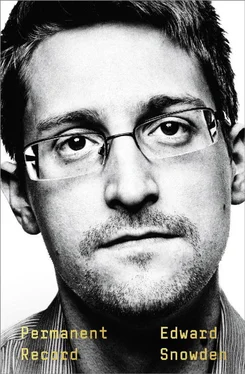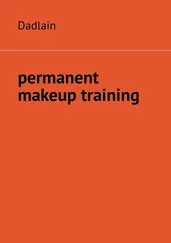The government job that had sponsored me for my TS/SCI clearance wasn’t the one I wanted, but the one I could find: I was officially an employee of the state of Maryland, working for the University of Maryland at College Park. The university was helping the NSA open a new institution called CASL, the Center for Advanced Study of Language.
CASL’s ostensible mission was to study how people learned languages and to develop computer-assisted methods to help them do so more quickly and better. The hidden corollary of this mission was that the NSA also wanted to develop ways to improve computer comprehension of language. If the other agencies were having difficulties finding competent Arabic (and Farsi and Dari and Pashto and Kurdish) speakers who passed their often ridiculous security checks to translate and interpret on the ground—I know too many Americans rejected merely because they had an inconvenient distant cousin they’d never even met—the NSA was having its own tough time ensuring that its computers could comprehend and analyze the massive amount of foreign-language communications that they were intercepting.
I don’t have a more granular idea of the kinds of things that CASL was supposed to do, for the simple reason that when I showed up for work with my bright, shiny clearance, the place wasn’t even open yet. In fact, its building was still under construction. Until it was finished and the tech was installed, my job was essentially that of a night-shift security guard. My responsibilities were limited to showing up every day to patrol the empty halls after the construction workers—those other contractors—were finished, making sure that nobody burned down the building or broke in and bugged it. I spent hour after hour making rounds through the half-completed shell, inspecting the day’s progress: trying out the chairs that had just been installed in the state-of-the-art auditorium, casting stones back and forth across the suddenly graveled roof, admiring the new drywall, and literally watching the paint dry.
This is the life of after-hours security at a top secret facility, and truthfully I didn’t mind it. I was getting paid to do basically nothing but wander in the dark with my thoughts, and I had all the time in the world to use the one functioning computer that I had access to on the premises to search for a new position. During the daytime, I caught up on my sleep and went out on photography expeditions with Lindsay, who—thanks to my wooing and scheming—had finally dumped her other boyfriends.
At the time I was still naive enough to think that my position with CASL would be a bridge to a full-time federal career. But the more I looked around, the more I was amazed to find that there were very few opportunities to serve my country directly, at least in a meaningful technical role. I had a better chance of working as a contractor for a private company that served my country for profit; and I had the best chance, it turned out, of working as a subcontractor for a private company that contracted with another private company that served my country for profit. The realization was dizzying.
It was particularly bizarre to me that most of the systems engineering and systems administration jobs that were out there were private, because these positions came with almost universal access to the employer’s digital existence. It’s unimaginable that a major bank or even a social media outfit would hire outsiders for systems-level work. In the context of the US government, however, restructuring your intelligence agencies so that your most sensitive systems were being run by somebody who didn’t really work for you was what passed for innovation.
* * *
THE AGENCIES WERE hiring tech companies to hire kids, and then they were giving them the keys to the kingdom, because—as Congress and the press were told—the agencies didn’t have a choice. No one else knew how the keys, or the kingdom, worked. I tried to rationalize all this into a pretext for optimism. I swallowed my incredulity, put together a résumé, and went to the job fairs, which, at least in the early aughts, were the primary venues where contractors found new work and government employees were poached. These fairs went by the dubious name of “Clearance Jobs”—I think I was the only one who found that double meaning funny.
At the time, these events were held every month at the Ritz-Carlton in Tysons Corner, Virginia, just down the road from the CIA’s headquarters, or at one of the grubbier Marriott-type hotels near the NSA’s headquarters at Fort Meade. They were pretty much like any other job fair, I’m told, with one crucial exception: here, it always felt like there were more recruiters than there were recruits. That should give you an indication of the industry’s appetite. The recruiters paid a lot of money to be at these fairs, because these were the only places in the country where everyone who walked through the door wearing their stickum name tag badge had supposedly already been prescreened online and cross-checked with the agencies—and so was presumed to already have a clearance, and probably also the requisite skills.
Once you left the well-appointed hotel lobby for the all-business ballroom, you entered Planet Contractor. Everybody would be there: this wasn’t the University of Maryland anymore—this was Lockheed Martin, BAE Systems, Booz Allen Hamilton, DynCorp, Titan, CACI, SAIC, COMSO, as well as a hundred other different acronyms I’d never heard of. Some contractors had tables, but the larger ones had booths that were fully furnished and equipped with refreshments.
After you handed a prospective employer a copy of your résumé and small-talked a bit, in a sort of informal interview, they’d break out their binders, which contained lists of all the government billets they were trying to fill. But because this work touched on the clandestine, the billets were accompanied not by standardized job titles and traditional job descriptions but with intentionally obscure, coded verbiage that was often particular to each contractor. One company’s Senior Developer 3 might or might not be equivalent to another company’s Principal Analyst 2, for example. Frequently the only way to differentiate among these positions was to note that each specified its own requirements of years of experience, level of certifications, and type of security clearance.
After the 2013 revelations, the US government would try to disparage me by referring to me as “only a contractor” or “a former Dell employee,” with the implication that I didn’t enjoy the same kinds of clearance and access as a blue-badged agency staffer. Once that discrediting characterization was established, the government proceeded to accuse me of “job-hopping,” hinting that I was some sort of disgruntled worker who didn’t get along with superiors or an exceptionally ambitious employee dead-set on getting ahead at all costs. The truth is that these were both lies of convenience. The IC knows better than anyone that changing jobs is part of the career track of every contractor: it’s a mobility situation that the agencies themselves created, and profit from.
In national security contracting, especially in tech contracting, you often find yourself physically working at an agency facility, but nominally—on paper—working for Dell, or Lockheed Martin, or one of the umpteen smaller firms that frequently get bought by a Dell or a Lockheed Martin. In such an acquisition, of course, the smaller firm’s contracts get bought, too, and suddenly there’s a different employer and job title on your business card. Your day-to-day work, though, remains the same: you’re still sitting at the agency facility, doing your tasks. Nothing has changed at all. Meanwhile, the dozen coworkers sitting to your left and right—the same coworkers you work with on the same projects daily—might technically be employed by a dozen different companies, and those companies might still be a few degrees removed from the corporate entities that hold the primary contracts with the agency.
Читать дальше












